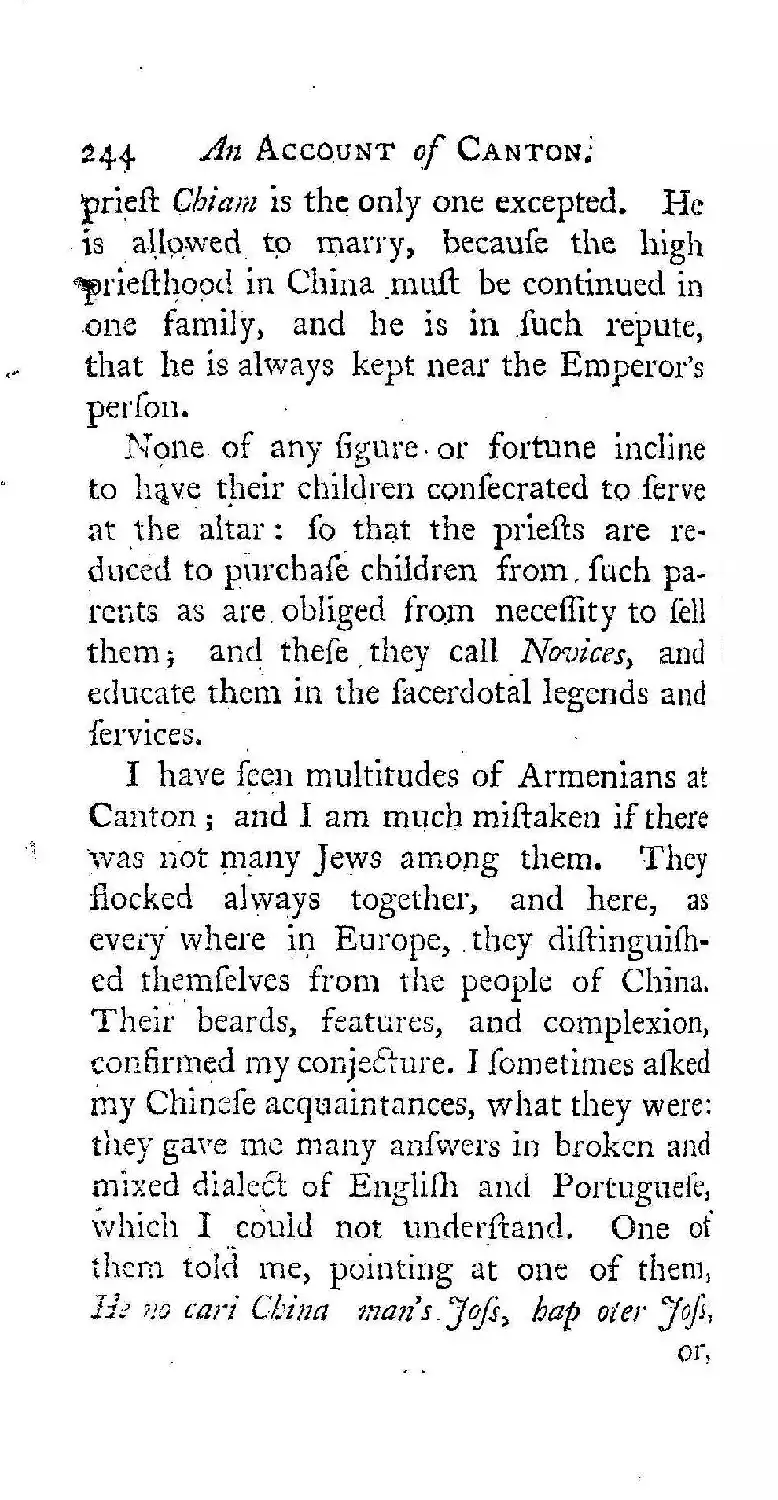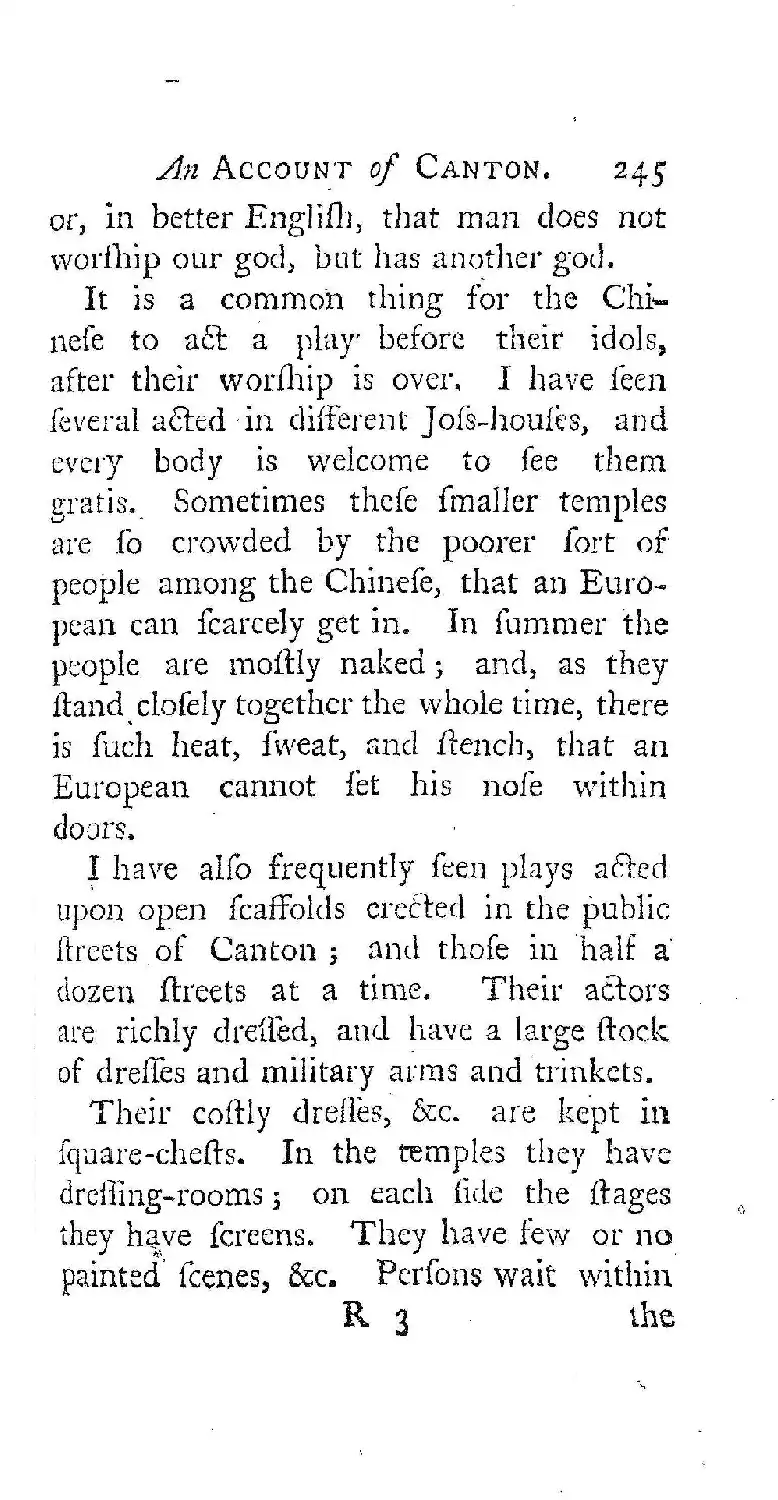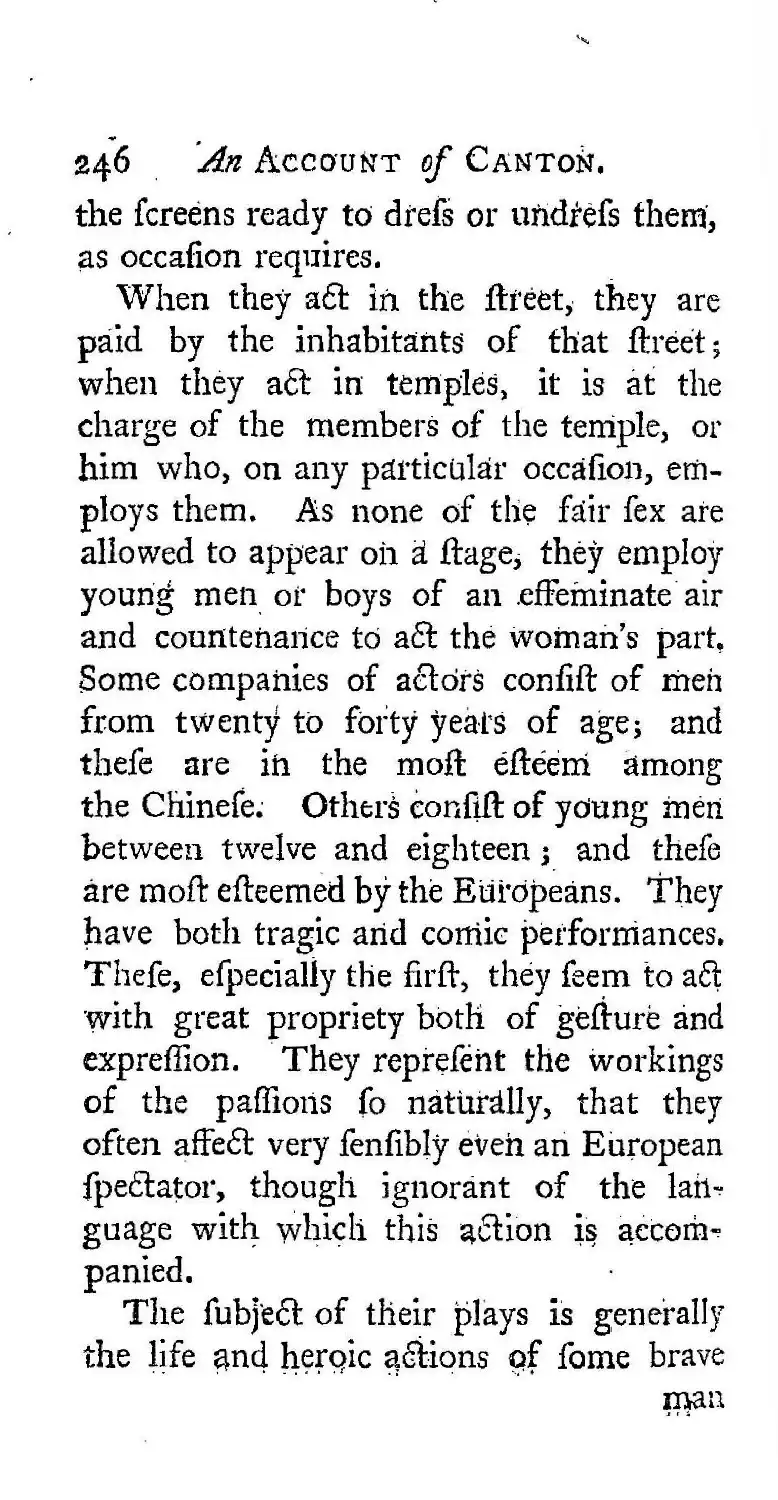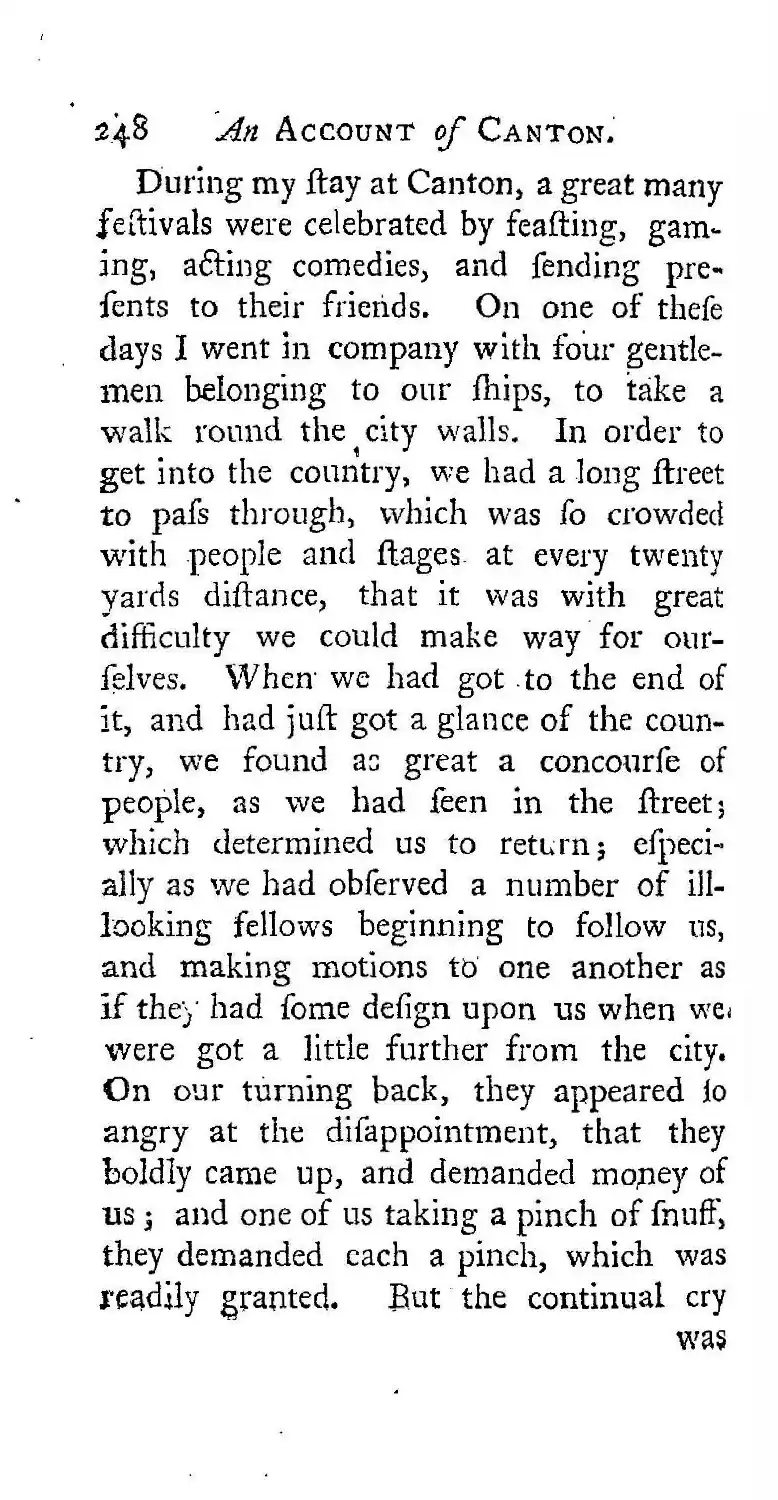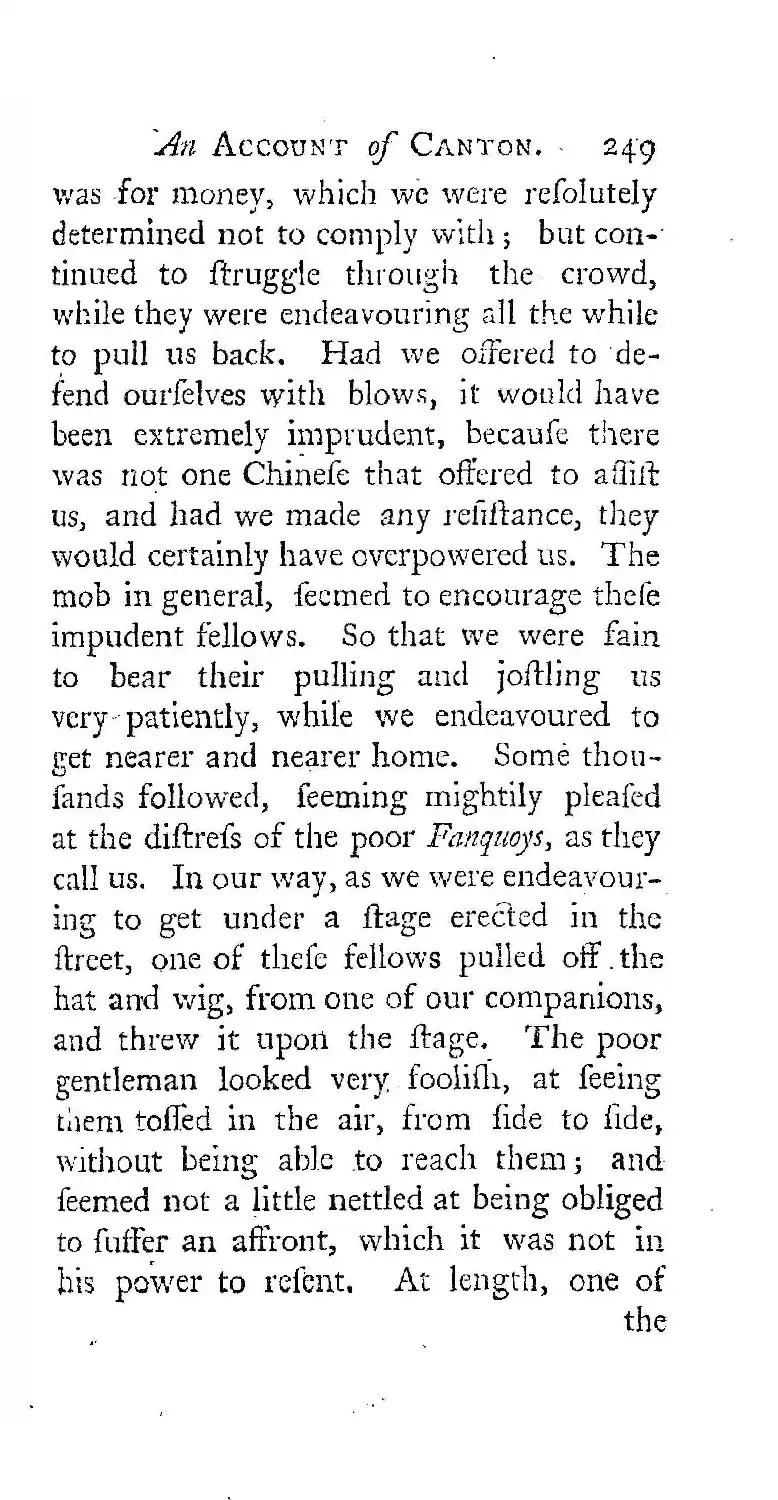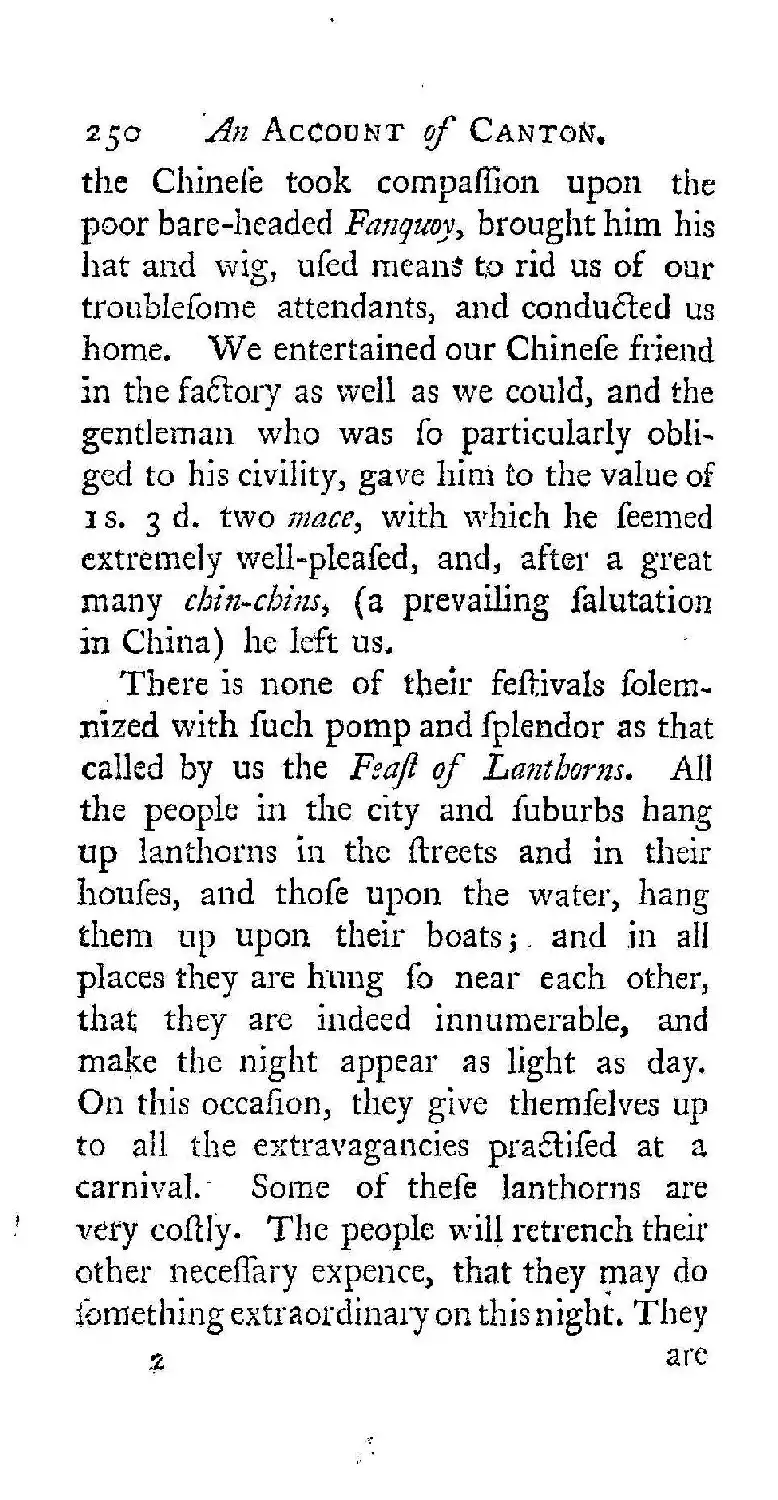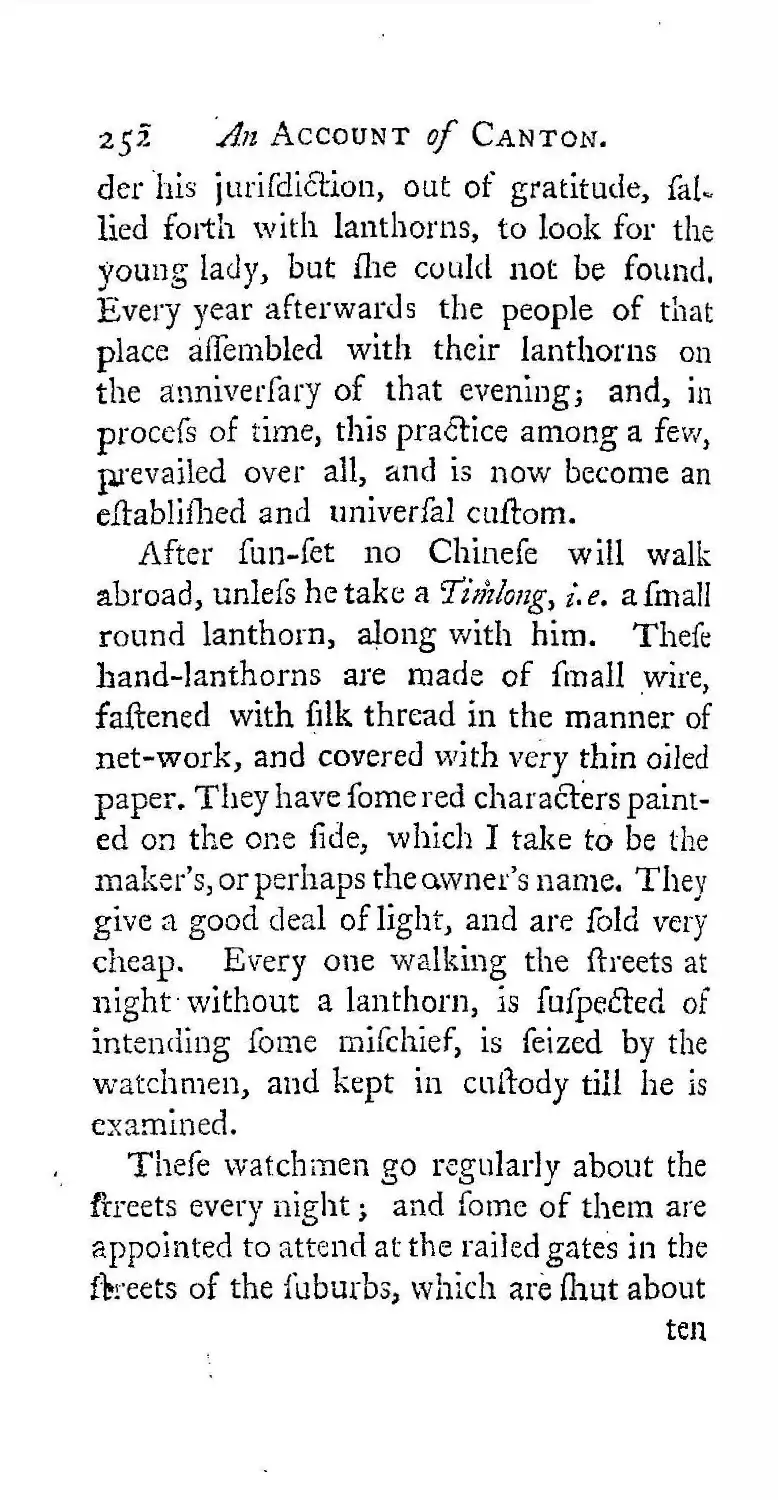A Voyage to the East Indies in 1747 and 1748. 2
- Info
- Pages
- Transcript
- Related
I have seen multitudes of Armenians at Canton; and I am much mistaken if
there was not many Jews among them. They I flocked always together, and
here, as every where in Europe, they distinguished themselves from the
people of China. 1 Their beards, features, and complexion, I confirmed
my conjecture. I sometimes asked my Chinese acquaintances, what they
were: they gave me many answers in broken and mixed dialect of English
and Portuguese, which I could not understand. One of them told me,
pointing at one of them, He no cari China man’s Joss, hap oter Joss, or,
in better English, that man does not worship our god; but has another
god.
It is a common thing for the Chinese to act a play before their idols,
after their worship is over. I have seen several acted in different
Joss-houses, and every body is welcome to see them gratis. Sometimes
these smaller temples are so crowded by the poorer fort of people among
the Chinese, that an European can scarcely get in. In summer the people
are mostly naked; and, as they stand closely together the whole time,
there is such heat, sweat, and stench, that an European cannot set his
nose within doors.
I have also frequently seen plays acted upon open scaffolds erected in
the public streets of Canton; and those in half a dozen streets at a
time. Their actors are richly dressed, and have a large stock of dresses
and military arms and trinkets.
Their costly dresses, &c. are kept in square-chests. In the temples they
have dressing-rooms; on each side the stages they have screens. They
have few or no painted scenes, &c. Persons wait within the screens ready
to dress or undress them, as occasion requires.
When they act in the street, they are paid by the inhabitants of that
street; when they act in temples, it is at the charge of the members of
the temple, or him who, on any particular occasion, employs them. As
none of the fair sex are allowed to appear on a stage, they employ young
men or boys of an effeminate air and countenance to act the woman’s
part. Some companies of actors consist of men from twenty to forty years
of age; and these are in the most esteem among the Chinese. Others
consist of young men between twelve and eighteen; and these are most
esteemed by the Europeans. They have both tragic and comic performances.
These, especially the first, they seem to act with great propriety both
of gesture and expression. They represent the workings of the passions
to naturally, that they often affect very sensibly even an European
spectator, though ignorant of the language with which this action is
accompanied.
The subject of their plays is generally the life and heroic actions of
some brave man among their ancestors. Some of my Chinese acquaintance
told me, that these plays were instituted, and often repeated, to
recommend bravery and virtue, and to ridicule vice; and to give the mob
an idea of the constitution, the different degrees of dignity in the
empire, and the authority and manners of the court; which, in such an
extensive empire, the common people could not be otherwise informed of.
The whole streets are so filled on these occasions with a pleased and
attentive crowd, that you cannot pass by. When an actor plays his part
well, the mob all unite in calling him to return to the stage, and
re-act his part. I have seen young boys, resembling young women, in
beauty, effeminacy and dress, act the females part so well, that the mob
obliged them to act it three times over before they were allowed to
leave the stage.
The plays are generally concluded with tumbling, fighting, or combating
with giants or wild beasts; or else with some humorous postures,
gestures, and expressions, calculated to raise a laugh.
During my stay at Canton, a great many festivals were celebrated by
feasting, gaming, acting comedies, and sending presents to their
friends. On one of these days I went in company with four gentlemen
belonging to our ships, to take a walk round the city walls. In order to
get into the country, we had a long street to pass through, which was so
crowded with people and stages at every twenty yards distance, that it
was with great difficulty we could make way for ourselves. When we had
got to the end of it, and had just got a glance of the country, we found
as great a concourse of people, as we had seen in the street; which
determined us to return; especially as we had observed a number of
ill-looking fellows beginning to follow us, and making motions to one
another as if they had some design upon us when we were got a little
further from the city. On our turning back, they appeared to angry at
the disappointment, that they boldly came up, and demanded money of us;
and one of us taking a pinch of snuff, they demanded each a pinch, which
was readily granted. But the continual cry was for money, which we were
resolutely determined not to comply with; but continued to struggle
through the crowd, while they were endeavouring all the while to pull us
back. Had we offered to defend ourselves with blows, it would have been
extremely imprudent, because there was not one Chinese that offered to
assist us, and had we made any resistance, they would certainly have
overpowered us. The mob in general, seemed to encourage these impudent
fellows. So that we were fain to bear their pulling and jostling us very
patiently, while we endeavoured to get nearer and nearer home. Some
thousands followed, seeming mightily pleased at the distress of the poor
Fanquoys, as they call us. In our way, as we were endeavouring to get
under a stage erected in the street, one of these fellows pulled off the
hat and wig, from one of our companions, and threw it upon the stage.
The poor gentleman looked very foolish, at seeing them tossed in the
air, from side to side, without being able to reach them; and seemed not
a little nettled at being obliged to suffer an affront, which it was not
in his power to resent. At length, one of the Chinese took compassion
upon the poor bare-headed Fanquoy, brought him his hat and wig, used
means to rid us of our troublesome attendants, and conducted us home. We
entertained our Chinese friend in the factory as well as we could, and
the gentleman who was so particularly obliged to his civility, gave him
to the value of IS. 3d. two mace, with which he seemed extremely
well-pleased, and, after a great many chin-chins, (a prevailing
salutation in China) he left us.
There is none of their festivals solemnized with such pomp and splendor
as that called by us the Feast of Lanthorns. All the people in the city
and suburbs hang up lanthorns in the streets and in their houses, and
those upon the water, hang them up upon their boats; and in all places
they are hung so near each other, that they are indeed innumerable, and
make the night appear as light as day. On this occasion, they give
themselves up to all the extravagancies practised at a carnival. Some of
these lanthorns are very costly. The people will retrench their other
necessary expence, that they may do something extraordinary on this
night. They are illuminated either with wax-candles or with lamps. The
generality of these lanthorns are about four foot high; some round,
others square. The panes are of transparent silk or finest gauze, having
human figures, rocks, trees and flowers, painted upon them, in very
lively colours. Some of the grand lanthorns have the figures; of men on
horseback, deer, dogs, and many other figures of animals, nicely cut
out, which being made to move on the inside, appear very lively to the
spectators without. The number of lanthorns is almost infinite; the
gilding, carving, silk, painting, and other expences attending them,
must amount to a vast sum. In short, on this illuminated night, the
whole people seem to run mad for they know not what. I wish our
Europeans could be excepted from the charge.
The Chinese say, that this feast took its rise from the following
accident. A great Mandarine, who had used the people under him with
great humanity and tenderness, had a beloved daughter, who took it into
her head one evening to throw herself into the river, and was drowned.
As soon as she was missed, the whole people both in town and country,
who lived under his jurisdiction, out of gratitude, sallied forth with
lanthorns, to look for the young lady, but she could not be found. Every
year afterwards the people of that place assembled with their lanthorns
on the anniversary of that evening; and, in process of time, this
practice among a few, prevailed over all, and is now become an
established and universal custom.
After sun-set no Chinese will walk abroad, unless he take a Timlong,
i.e. a small round lanthorn, along with him. These hand-lanthorns are
made of small wire, fastened with silk thread in the manner of net-work,
and covered with very thin oiled paper. They have some red characters
painted on the one side, which I take to be the maker’s, or perhaps the
owner’s name. They give a good deal of light, and are fold very cheap.
Every one walking the streets at night without a lanthorn, is suspected
of intending some mischief, is seized by the watchmen, and kept in
custody till he is examined.
